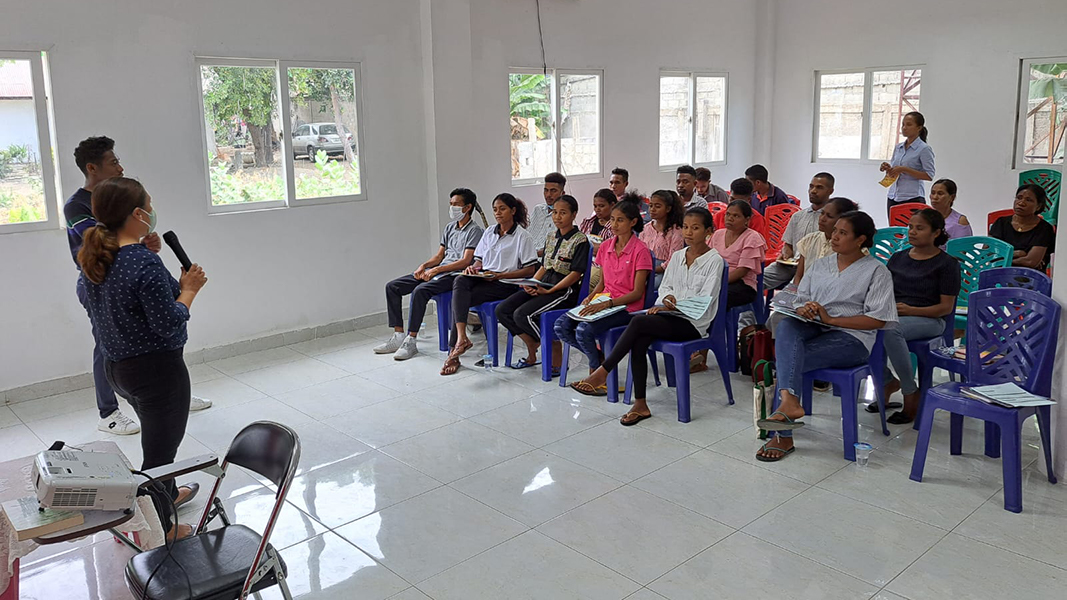High prevalence of gender-based violence a major challenge in Timor Leste, observe participants of CCA programme
 Participants in session at the CCA's Ecumenical Women's Action Against Violence (EWAAV) Programme in Dili, East Timor
Participants in session at the CCA's Ecumenical Women's Action Against Violence (EWAAV) Programme in Dili, East Timor
Dili (Timor-Leste): The high prevalence of gender-based violence, especially domestic violence, in Timor Leste is considered to be a major challenge for the long-term conflict-ridden Southeast Asian country. This was the experience shared by the participants of a two-day training programme organised by the Christian Conference of Asia (CCA).
“Not only is the extent of gender-based violence a serious concern, but also the severity of the violence,” observed the participants.
Women in the traditional society of a long-term conflict-ridden country, Timor Leste, experience increasing levels of violence. Social and cultural practices, along with trauma associated with conflict and violence, often place women at risk of experiencing gender inequality and gender-based violence (GBV), despite the country’s ratification of the Convention on the Elimination of Discrimination against Women in 2003 and other legislation which aim to protect women from gender-based violence.
A national training programme with a focus on overcoming gender-based violence organised by the Christian Conference of Asia (CCA) as part of its Ecumenical Women's Action Against Violence (EWAAV) in collaboration with the Igreja Protestante iha Timor Loro Sa'e (IPTL), aimed to foster and promote a culture of resistance, aimed at preventing violence against women.
The first in-person national consultation organised by CCA and held on 20 and 21 September 2022 after more than two years of a gap since the COVID-19 outbreak in early 2020, brought together 35 participants from different parts of Timor Leste. The training covered topics such as 'Women's Rights to Full Life', 'Understanding Gender and Gender-Based Violence', 'Gender-Based Violence Challenges in Timor-Leste', and 'Women as Equal Partners in God's Mission'.
The session on 'Women's Rights to the Fullness of Life' was led by Dr Hellen Hill, visiting Professor at Universidade Nacional Timor Lorosa'e. As a person who has been involved in Timor Leste for decades, Dr Hill illustrated stories of Timorese women's contribution to self-determination and struggle, viewing it through the lens of the story of Maria and Martha as good models of discipleship for diakonial ministry. The attendance of Timorese women at various Women’s Conferences since 1985 emphasised the importance of Timorese women and their inherent rights.
Berta Antonieta Tilman-Pereira, a Timorese activist who works for a women's organisation, led the session on ending gender-based violence. She facilitated interactive games to demonstrate the various opportunities for women and men in Timor-Leste to exercise their rights.
Arceli Pepito Bile of CCA led the Bible study concerning ‘Women as Equal Partners in God’s Mission.’ She mentioned at least three institutions that can contribute to women's subordination but also serve as a place to address family issues, church/religious institutions, and mass media, including social media.
At the end of the programme, participants developed a programme action plan and were challenged to share the training output through networking and collaboration with churches and civil society organisations, and in this way advocate for the full realisation of women's rights.
On the UN Gender Inequality Index, Timor Leste ranks 128th out of 187 countries (GII). With 59 percent of women experiencing intimate partner violence, gender-based violence is the most common type of crime reported to the police. However, the figure only represents a fraction of actual cases because most domestic violence incidents are handled informally and never reported to law enforcement.










